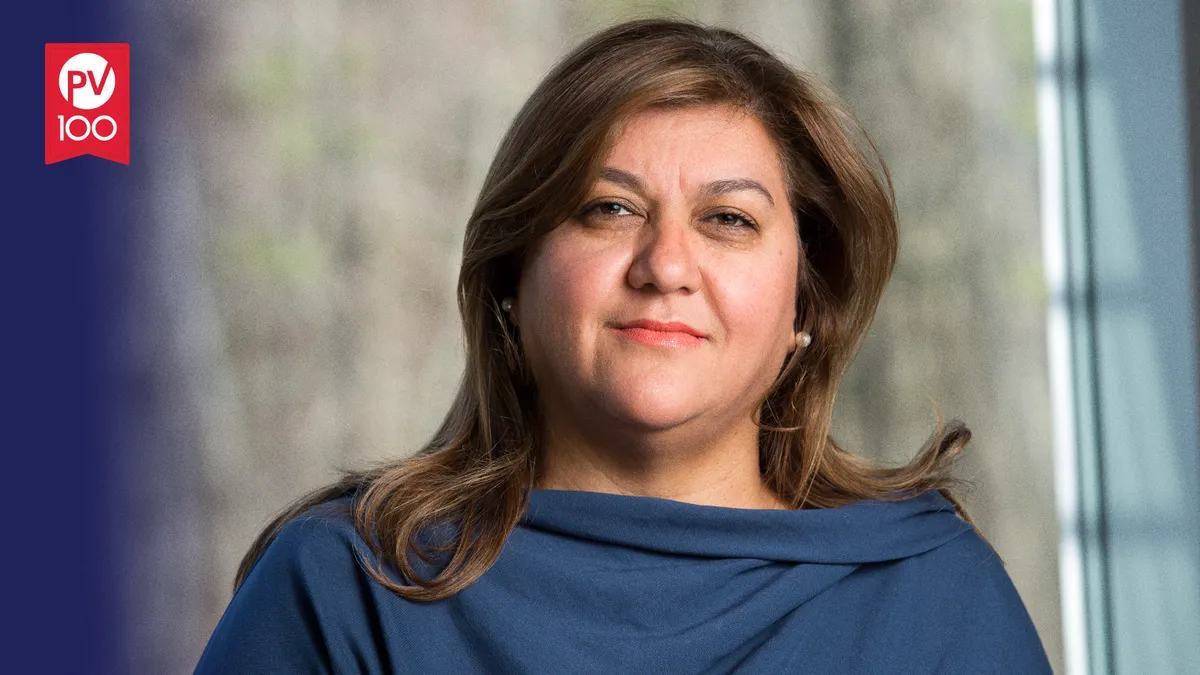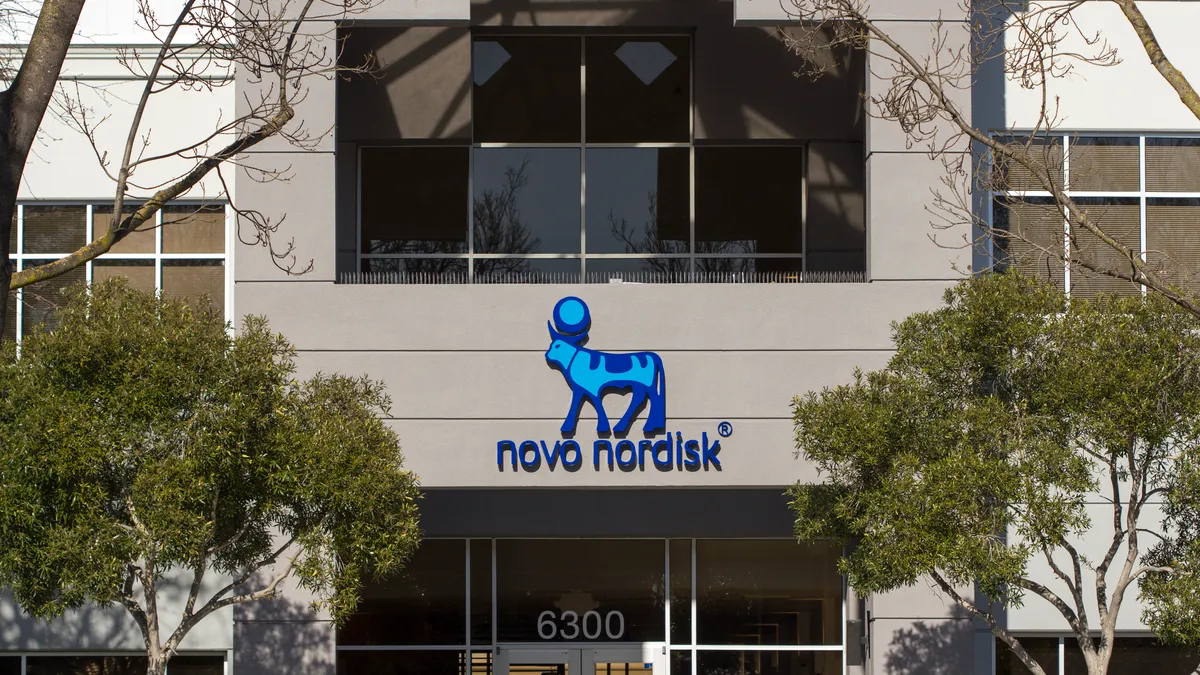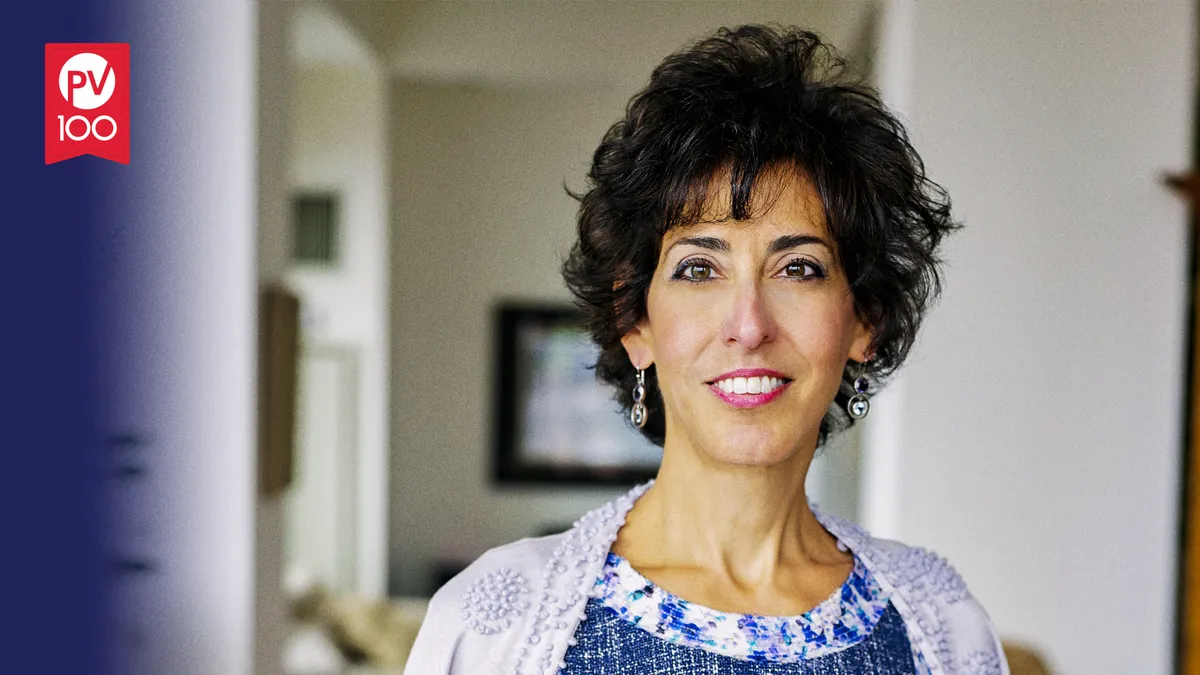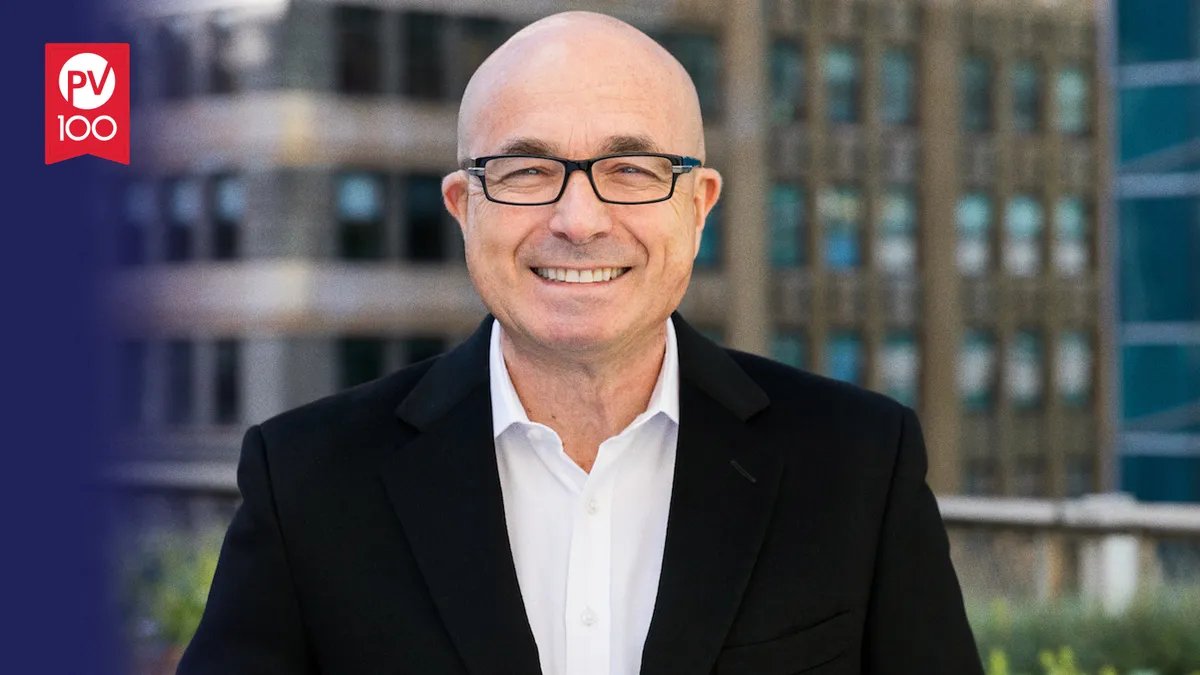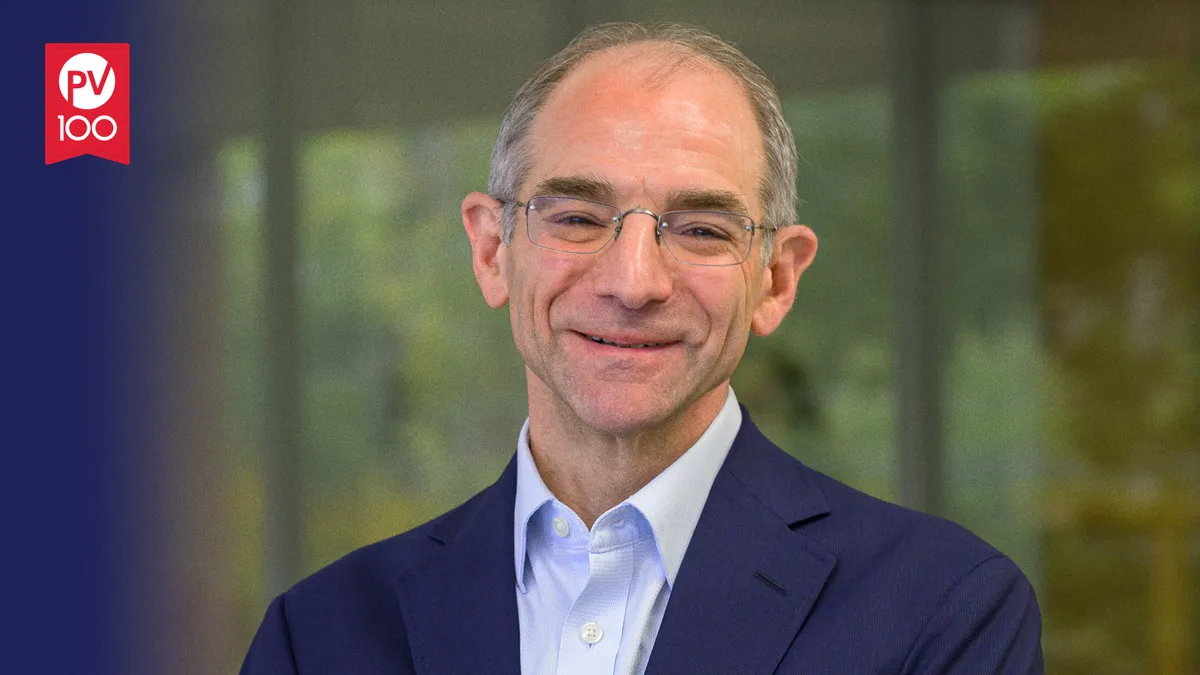Editor’s note: This story is part of our 2023 Red Jacket awards feature.
When Helen Sabzevari began studying how the immune system could be harnessed to fight cancer as a Ph.D. student in the 80s and 90s, the surrounding skepticism was intense.
“I was told by so many people I was wasting my life because it would never be successful,” she recalled. “But that’s where innovation comes from. I always knew that. To accept that something is impossible — that’s when innovation stops.”
So Sabzevari didn’t stop. And after a fruitful career in academia, Sabzevari eventually moved into biopharma where she was swept into the immunotherapy boom that proved her early skeptics wrong.
But rising above challenges is par for the course for clinical-stage Precigen’s CEO, whose dogged determination traces back to her family roots.
Growing up in Iran, Sabzevari’s parents always stressed the importance of education for their children — even for their daughter, which she said wasn’t typical “for the culture.” And when the Iranian Revolution broke out in 1979 and Sabzevari’s parents feared the upheaval could interrupt her progress in high school, they sent her to live in the U.S.
Once settled in New York City, Sabzevari was told that her education qualified her to head straight to college. So at the age of just 16 — and with shaky English skills — Sabzevari began her studies.
Her desire to work in science quickly clicked into place. At Sloan Kettering, Sabzevari was so impressed by a research team she saw working, she promised the head of the lab that she’d do any kind of work they could offer. She eventually scored a volunteer position and her scientific career was born.
"We need medicines that are tailor-made so that no patients are left behind."

Helen Sabzevari
CEO, Precigen
Sabzevari would go on to earn a Ph.D., complete her postdoctoral work at Scripps Research Institute, and advance immunotherapy research at the National Institutes of Health. After transitioning into her initial industry job at Merck KGaA, where she was senior vice president and global head of the immuno-oncology therapeutic area, Sabzevari was instrumental in developing Bavencio, a PD-L1-targeting monoclonal antibody that became the first FDA-approved immunotherapy for metastatic Merkel cell carcinoma.
Now at the head of Precigen, which is focused on precision cell and gene therapies, Sabzevari is aiming to push the immunotherapy field to its next major milestone with a CAR-T cell platform developed to crank out therapies in a matter of hours instead of the weeks it can take to generate similar treatments. Precigen spent several years fine tuning the platform, called UltraCAR-T, so it can be used in a hospital cleanroom, and is now testing it in numerous solid and hematological tumors.
“We developed a system that changes manufacturing to genetically modify a patients’ T cells overnight without the need for off-site centralized manufacturing…and without taking weeks, because often the patient doesn’t have that much time,” she said. “And, we believe this manufacturing can be done at a significantly lower cost allowing access for more patients in the future.”
The company’s clinical pipeline also leverages precision immunology to create multifunctional gene therapies utilizing its AdenoVerse platform aimed at oncology and infectious diseases. Its lead asset, PRGN-2012, was developed to treat a debilitating rare disease called recurrent respiratory papillomatosis, and received FDA orphan drug and breakthrough therapy designations.
These milestones are an apt culmination of Sabzevari’s long-held devotion to immunotherapy R&D and what she described as a “calling in life” to use her training to advance change for patients, while demonstrating that women — especially Iranian women — “can and should do this kind of work.”
Here, the multi-time PharmaVoice 100 winner and Red Jacket describes the advice that inspired her to leap into drug development, her leadership style and her unfinished business in the industry.
This interview has been edited for brevity and style.
PHARMAVOICE: Why did you make the leap from academia into the industry?
HELEN SABZEVARI: When I went to NIH, the transition started. I had completed my postdoctoral work and had a Ph.D. in basic research, and my mentor challenged me and said, ‘You have investigated some of the most basic mechanisms. You’ve worked with thousands of mice. But what have you done in terms of translating this research for your fellow humans?’ That pushed me to switch into translational medicine.
I was very grateful for that training and the success I had at NIH leading the molecular immunology group and working on cancer vaccines. Then when Merck KGaA (Darmstadt, Germany) approached me in 2008, it took me a while to reconcile that I was leaving academia and institutional research. But one thing I understood — I was on a path of translational medicine. As much as I loved basic research and what it contributes to humanity, I wanted to move in a direction that took me closer to bringing new therapies to patients.
What promise do you see in the cell and gene therapy space?
I consider the next frontier in immunotherapy to be cell and gene therapies because we have not yet fully harnessed the immune system as a weapon against diseases. Checkpoint inhibitors have been instrumental in treating many patients, but there is still a long way to go. In the best case scenario, we are benefiting a small percentage of patients. And, despite tremendous advances in various cancer indications, such as lung cancer, melanoma, and bladder cancer, there are a number of indications, such as ovarian, pancreatic and many hard-to-treat blood cancers where innovation is needed. I believe that innovation in cell and gene therapies is the next cutting edge for these difficult to treat diseases.
How does the UltraCAR-T platform work?
With UltraCAR-T, we developed a non-viral platform unlike anything that existed. We were able to overcome the deficiencies of existing platforms and differentiated from classical CAR-Ts manufactured using lentiviruses. In academia, they were evaluating on non-viral platforms, but they could not successfully modify a large number of cells, so everyone thought non-viral was dead and moved to lentiviruses for manufacturing. We took an older non-viral platform and spent years advancing it, addressing shortcomings and creating a device that genetically modifies a patient’s own cells using overnight manufacturing.
With UltraCAR-T, a patient can come to the clinic for apheresis and their T cells are separated and transfected by non-viral UltraVectors using our proprietary device, UltraPorator, that is designed to genetically modify these cells in a matter of minutes in the cleanroom of a hospital. In under 12 minutes, our UltraPorator system can genetically modify over 4 billion autologous T cells. Genetically modified cells are then put it in an incubator in a cleanroom overnight. The next morning after quality control testing, personalized UltraCAR-T cells are released for infusion back to the patient. This can all happen within 24 hours, which eliminates costly and slow off-site manufacturing.
How would you describe your leadership style?
I lead from the base — not from the tower. With that comes my belief that you have to be integrated with your team -- you walk shoulder-to-shoulder, you mentor, coach, celebrate, and go through the challenges together as one team.
One other thing that is very important to me is to have courage and confidence, but anticipate what the next steps or challenges could be — having a plan B and C. Some people think that means you don’t think your plan A is good enough and they see it as a deficiency. But I see it as preparedness and being down to earth as a leader. You know nothing is 100%, and unexpected challenges come up. I think that’s the difference between successful leaders and unsuccessful leaders.
What kind of mark do you want to leave on the industry?
If I can bring to patients treatments that cure diseases and leaves no patient behind. This would be the ultimate goal — I know this is a tall order in pharma — but we should not shy away from the challenge.
Of all the things I have gone through in my career, one incident stands out: I talked to a patient in a clinical trial, and unfortunately, the patient was part of that 40% to 50% that were not responding. And the patient said, ‘I’m sorry that I failed the trial.’ And that was a big moment for me because it’s not the failure of the patient. It’s our failure that we couldn’t make that drug really precise for that patient. We need medicines that are tailor-made so that no patients are left behind.
See our full list of 2023 PharmaVoice 100 winners.



